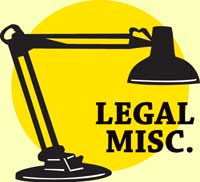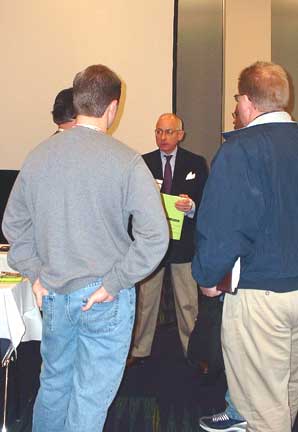Legal Issues Pertaining to Sweeping

Legal Issues Pertaining to Sweeping |
 |
Good Contracts Make for Great Relationshipsby Gerald Katz
The following article covers items of interest to smaller sweeping contractors, as well as topics of interest to municipalities. Gerald (Jerry) Katz' law practice is devoted exclusively to construction contract issues. Since 1975 he has served many general and subcontractors of all the various specialty trades. His firm handles all manner of construction issues from negotiation, drafting of contracts from the outset, bid protests, procurement issues, performance issues, changes, delays, extras, suspensions of work, and loss productivity claims from prior to job start through to conclusion. To begin with, keep in mind that the advice we offer is relevant to both sides of the contract, no matter who is involved. By that I mean that you should recognize that every issue we advise our clients on has a flip side. For example, if you take a particular contract provision, like no damages for delay clause, there is an issue there that is relative to the general contractor, an issue that is relevant to the owner and an issue also relative to the sub. The preference in contract terms typically changes depending on whose relationship you're working to improve, the owner, the general or the general's sub. The owner's principal concern is timely completion of the project without claims for extras, changes and things like that. The contractor's principal concern is getting paid, though he is also interested in things relative to changes, extras, different site conditions and things like that. Based on comments of earlier pavement exposition programs I have given, by far the principal concern on the contractor's side is getting paid. The smaller contractors are particularly interested in the most efficient means of collecting their money, since there is not enough money on the table or in their profit to go through an extensive lawsuit to collect their money. As a result, the advice I give them generally is to protect themselves by carefully selecting the terms of the contract. The typical small contractor in this industry is working for an owner, so in a sense he is a prime contractor. He also may be working for a homeowner or a small developer or somebody like that. Because of that, the sweeping contractor is often in a position to actually prepare the contract to suggest or submit to his client the form. This means he has opportunity to seek such contract provisions as an attorney's fee clause, so if he has to chase the customer to collect his money he is will get his attorney's fees paid if he prevails. The contractor also can require that any dispute be resolved in a lower court, as opposed to a more expensive circuit court. He can also select arbitration, which is a relatively speedy way of resolving disputes. He might also include a clause that provides for payment of interest on monies that are due or insert a clause that allows him to stop providing services in a short timeframe in the event he is not getting paid. Even if the other side hands him the contract to sign, he can still attempt to negotiate these types of provisions into that contract. Now, let's discuss the situation of the larger sweeping contractor or owner, such as a municipality, that enters into that type of contract. For them, the key issues are likely to be liquidated damages, no damages for delay clauses and indemnity clauses. Again, on each of those issues there is an owner's perspective and a contractor's perspective. On the no damages for delay clause, the municipality wants to be assured that if the job is delayed owing to something it does, its liability is limited to a time extension only. For the other side of the table on that same example, the sweeping contractor wants to be able to recover damages, dollars for delay, if he is not at fault for the delay. If the milling cleanup job he was awarded and has planned for some reason gets delayed 30, 60, 90 days or months, he may want to recover extended general conditions or home office overhead. So, for him the question on the no damages clause is either "can I get it out of the contract by negotiation" or, if I have to keep it in, "are there exceptions to it." The courts in most states recognize various exceptions. So, from the contractor's side it is important to understand what the exceptions are and how to take advantage of them. The same goes for indemnity, which is a major issue on any construction project. The owner wants to be protected in the event of personal injury or death arising out of the construction project, so typically the owner seeks indemnification from the contractor. The contractor has an interest in limiting the scope of that indemnity as much as possible, because that is a major risk to him. My advice is to offer ideas to the contractor on how to take the typical indemnity clause and add some words, tweak some words, in order to minimize the risk that the clause presents. No matter what your position, do your best to allocate your contractual risks to lower tiers. For example, when the prime contractor signs a contract with the owner, he has bought in to certain risks, no matter how good a negotiator he is. What he will try to do is allocate them to his subs because one of the ways of managing risk is to allocate it to somebody else. If you are a sweeping contractor, you, in turn, want to decline any risks you're able to decline. Insurance is a classic example of this process. By purchasing insurance, you pay a premium to transfer the risk to the carrier. Likewise, general contractors will try to transfer risks to their subcontractors and, if you are a subcontractor, you should try not to get them transferred to you. Let's discuss collecting money, something dear to the pocketbook of small contractors. There are some things small contractors can do to give them a better opportunity of collecting money. A number of malls, as an example, have become less solvent of late. Everyone recognizes that it's bad not to get paid. However, you also can't afford companies that stretch you out for two or three months. The first thing you should do is get to know your prospective customer. Before you sign the contract, ask yourself "Does this person have the resources to pay me, and if they don't or it is not certain, what is my remedy and what is my security? " You should do some due diligence on your customer so you can make a business decision on whether or not you want to enter into the contract. Signing a contract is basically equivalent to making a credit decision. It is almost like what a bank has to consider in extending a loan. For the smaller sweeping contractor doing private work there are essentially two forms of security. First and foremost is what is called a 'mechanic's lien. This is a legal means of collecting your money if your owner customer fails to pay. The second type of security, not always available, is a payment bond. That is something that is typically available to a subcontractor, not a prime contractor. Another option is to require your customer to pay by joint check or to place into escrow the funds from which you will be paid. All of these options are available only where you made the up-front analysis of the customer's ability to pay. If you don't ask the question at the right time, by the time you ask it it is too late. Some of the ways you can determine credit worthiness is word of mouth in the industry. Ask people who are supplying the same type of services about their payment experience from the prospective customer. If it's a large enough job and the funds are borrowed, you want to see a commitment letter from the bank. Probably for the more typical smaller contractor, you can find out by word of mouth. You go to your friendly competitors and find out if any of them had ever worked for that particular customer and, if so, what the payment history was like. If you don't want to talk to your competitors, talk to suppliers. Go to somebody who is selling him goods or other services and see if you can find out what the payment history is like. 
I also caution you to not let any client get too deep in your pocket, once you start the job, before you exercise your contract rights. Many standard form contracts do not allow you to suspend the work for non-payment until 30, 60, or more days have passed since the payment was due. If you allow such a clause in your contract, it means not only does the customer owe you 'x' dollars at the moment, but he will eventually be able to owe you additional dollars for the work you are contractually required to go ahead and do in the ensuing 30, 60, etc. days. So, if nothing else, you want to modify the contract before it is signed to allow you a shorter trigger point, so you don't have to continue to work for 30 or 60 days before you can say "enough." For much of the above, be sure you ask the questions up front. Don't wait until you sign a contract to find out the answers to questions like: "Can this person pay me? and "If not, how do I collect my money?" and "Is there a right of lien available?" Do not waive your right to lien when you sign a contract. The sidebar to this is to also be sure that when you sign a partial waiver every month, which is a standard procedure on a long contract, you are not waving your lien rights with the very first waiver you sign. And, if your position is as a sub on a large job, find out if there is a payment bond for the project. Ask these types of questions upfront, before you take on a new client. Then, monitor your receivables carefully so that accounts don't become 30, 60, 90 days delinquent before learning you have a problem. You may reach Gerald (Jerry) Katz by telephone at 703-761-3000, or reach him via email sent to gkatz@katzandstone.com. Jerry has also graciously consented to providing to us his extensive 50+ page handout from his seminar in electronic format. In it, you'll find more detail on some of the above information, as well as contract examples and much more. We have included this link as a Word document, which, once downloaded, should be able to be opened by most text editing programs. |
© 2005 - 2022
|
Legal Issues Contents
|